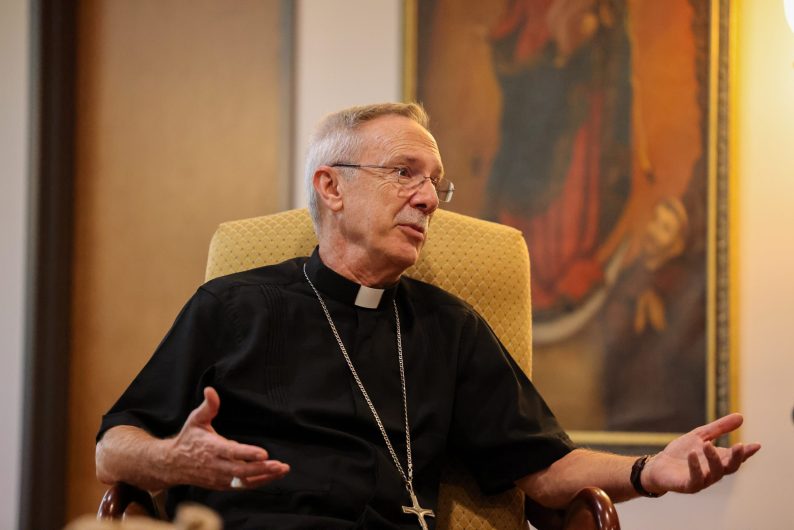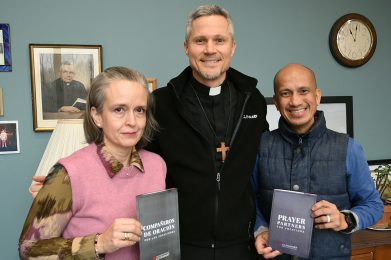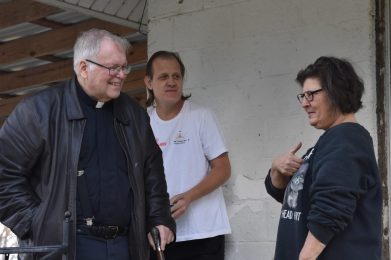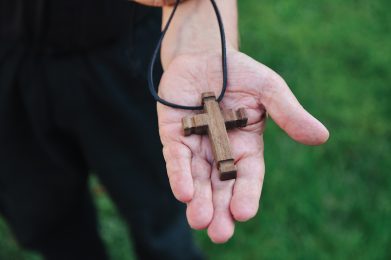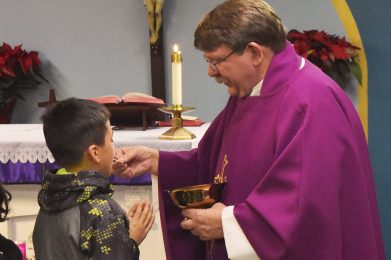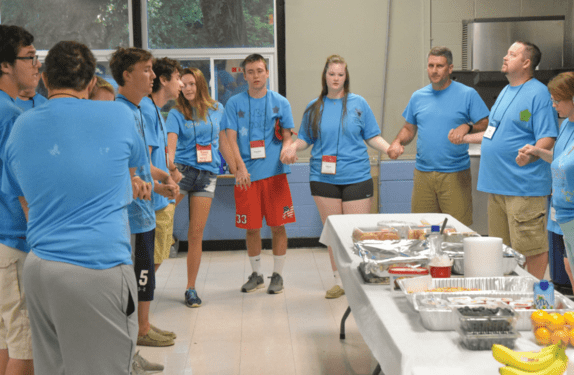Three years after his ordination as a priest, Father Luis Rafael Zarama was assigned to two parishes located in small towns north of Atlanta, Georgia. These two parishes were missions where Glenmary had served before the young priest’s arrival. By Omar Cabrera
Bishop Zarama recalls that when he arrived, he saw “the fruits of the work, dedication, and generosity that they [Glenmarians] showed during the time they served there.”
A decade later, in 2017, Pope Francis appointed Father Zarama as the first Latino bishop of the Diocese of Raleigh, North Carolina. As such, Bishop Zarama—a native of Colombia—now oversees more than 140 priests and 80 parishes, including two served by Glenmary.
The bishop received us in his office in Raleigh, where we discussed the growing presence of Latinos in the Catholic Church in the United States and the role of Glenmary, among other topics.
Q: So your first parishes had previously been led by Glenmary priests. Tell us a little more about that.
A: They were the ones who were there when Mass began to be celebrated in a community hall, little by little a church was built, and the community grew in a rural area where Catholics were scarce. Well, with the presence of the Glenmarians, the few Catholics found, through the Eucharist, a way to unite, to begin living the faith, to work for the faith, to be present in the town, to build a church, to form a community. And then, when I arrived, the church became too small, and a project to build a larger one was needed, given the way the community grew.
Q: What is your opinion of Glenmary’s work in bringing the Church’s presence to small towns like the ones where you served as a parish priest?
A: I believe it’s what the Holy Father Francis spoke of, about going to the peripheries. That’s the reality; it’s service where it’s needed, in places where generally few have the will to serve or few have the will to go, and that’s where it’s needed, where service is needed.
Q: The Catholic Church in the United States is experiencing a considerable increase in Hispanic parishioners. What is your pastoral approach to this reality?
A: Often, what happens is that the Latino presence is not recognized, but the Hispanic presence, the Latino presence, is there. In many places, there is fear of acknowledging that reality. And if it is not recognized, it is impossible to serve.
Here in the diocese, I believe half of the Catholic population is Hispanic, Latino. The goal, at least in my way of serving, is for all priests who are trained in the seminary to be bilingual, at least to celebrate the sacraments, so they can provide that service, because we cannot ignore it, and if they are not bilingual, there is practically nowhere to assign them.
On the other hand, it is about being able to make the communities at least feel comfortable and recognize the presence that is there. Because often one seeks to force integration, and that is not healthy; that is a process.
Q: Can you expand a little on that, of integration being forced rather than pursued as a process?
A: The thing is, friendship can’t be forced. Friendship comes as a process. You can’t force someone to be friends with someone else. And often, unintentionally or without understanding it, people force acceptance of each other when that’s not possible.
Friendship grows through a process of getting to know each other little by little, in moments, in events, in situations. And that’s what must be cultivated without pressure, without forcing, but simply with an open attitude. And to see that, as in every family, when a new member arrives, that new member changes the routine completely, not for bad reasons, but because there’s someone new, and that new person changes what we’ve been doing. It’s uncomfortable, but we accept it with joy and are open to what this new person brings.
It’s the same with our faith, it’s the same with our parishes. We are so diverse, because our Church is universal, it’s catholic, and we have that reality in a small way.
Q: Although it may seem like a rhetorical question, why are we as Catholics called to serve those most in need, including undocumented immigrants?
A: First of all, the situation of migration of undocumented people: It’s a situation that has existed here forever. And it’s a situation for which there is no political intention to fix it, because undocumented people are the workhorse in electoral campaigns, where they are used and manipulated to win votes. Some talk about removing them, others talk about fixing them. It’s the battle, it’s what they use to win votes, and once undocumented people have been manipulated, they simply ignore them. That is an abuse. Furthermore, it’s cheap labor that the country needs. So, they have no intention of granting them legal status because it’s cheap labor; undocumented people are needed.
Faced with that reality, why do we have to help? Because they are human beings. And a human being cannot be manipulated, a human being cannot be used. A human being must learn to be respected. We must help a human being discover his or her dignity. Amidst the circumstances of his or her life, he or she must find a place where he or she feels respected, appreciated, and cared for. And that is our role as the Church.

